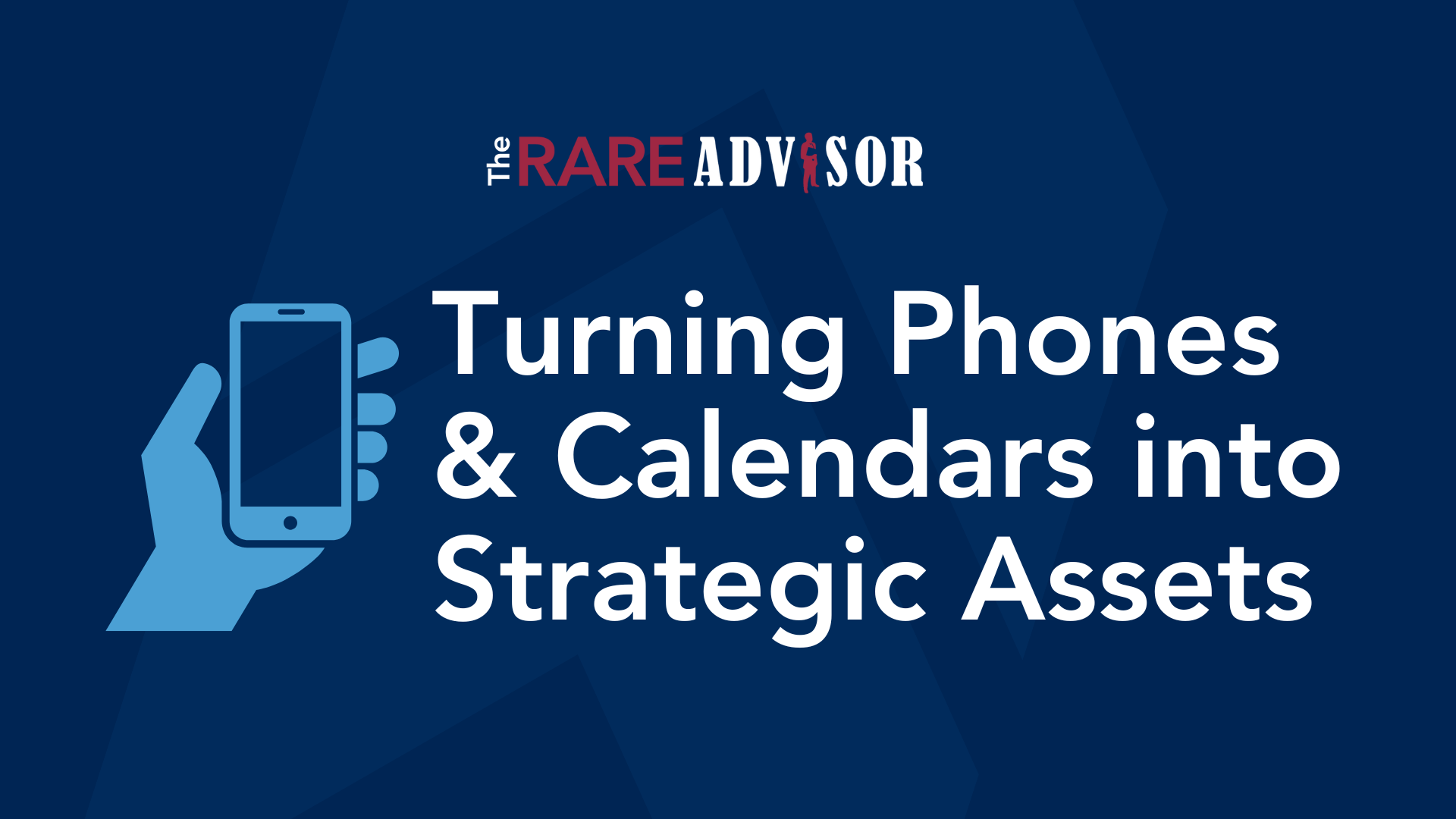Time Allocation: A Financial Advisor's New Year's Resolution

As the clock strikes midnight on New Year's Eve, many people around the world make resolutions to improve their lives in the coming year. For you, one of the most crucial resolutions you can make is to protect your most valuable resource: Time. In the fast-paced and ever-evolving world of financial advisory, effective time allocation is not just a luxury; it's a necessity. This article explores the importance of time allocation and provides practical tips for making the most of every precious moment in the year ahead.
The Value of Time:
Time is your most finite resource. In an industry where market fluctuations, client demands, and regulatory changes are constant, effective time allocation can be the key to success. Every minute spent on non-productive tasks is a missed opportunity to provide valuable insights to clients, analyze market trends, or enhance professional development.
One of the primary challenges you face is balancing the demands of client meetings, research, and administrative tasks. A New Year's Resolution to prioritize time allocation is an investment in both professional growth and client satisfaction.
Tips for Time Allocation:
1. Set Clear Goals
Begin the year by defining clear, achievable goals. Whether it's increasing the number of client meetings, expanding the client base, or enhancing investment strategies, having specific objectives provides a roadmap for effective time allocation.
2. Prioritize Tasks
Not all tasks are created equal. You should identify high-priority activities that directly contribute to your goals and focus on those first. This ensures that crucial tasks are addressed before less critical ones. Knowing your rainmaker revenue numbers will help identify how to best spend your time.
3. Delegate Wisely
If you’re the primary rainmaker in your firm, it’s imperative that you delegate routine administrative tasks or certain responsibilities to support staff to allow you to concentrate on strategic aspects of the practice. This not only improves efficiency but also fosters a collaborative and productive work environment. This all starts with having clearly defined roles and responsibilities in your organization.
4. Time Blocking
Implement time-blocking techniques to allocate specific periods for different activities. By dedicating focused time to tasks like client meetings, research, and personal development, you can enhance concentration and productivity. Start by building out a sample calendar by week. However, be wary of the 3 biggest time-sucks advisors face (e-mail, unsolicited phone calls, and an open-door policy) by making sure to allocate specific time for specific tasks like answering emails, returning phone calls, and team huddles to answer questions that arise throughout the day.
5. Utilize Technology
Embrace technology to streamline processes. You can leverage tools and software for tasks like client management, data analysis, and communication. Automation can significantly reduce time spent on repetitive activities, allowing you to concentrate on more complex and strategic aspects of their role.
Conclusion
As you embark on a new year, you should recognize that time is your most precious resource. By making a resolution to prioritize time allocation, you can position yourself for success in a dynamic and competitive industry. Setting clear goals, prioritizing tasks, delegating wisely, leveraging technology, and investing in professional development are essential steps toward optimizing time utilization. With effective time allocation, you can not only enhance your own professional satisfaction but also deliver superior service to your clients, ultimately building a more successful and fulfilling practice.
Available Resources:
- Game Time Calculator (Rainmaker Revenue Numbers)
- Sample Calendar by Week
- Sample Roles and Responsibilities Chart
Make sure to contact us in early January to explore Time Allocation best practices and discuss specific opportunities to create more time in your practice.
Author Info

Aaron Grady is the Advisor Consulting Director with USA Financial. He brings more than 18 years of Financial Services industry experience...
Related Posts

Access by Design: Turning Phones and Calendars into Strategic Assets
In this episode of The RARE Advisor, host Aaron Grady and practice management consultant Allan Oehrlein continue their discussion on time allocation by exploring what comes next: operationalizing structure across the entire advisory team. They break down why the phone is the “front door” to the firm and the calendar is the “engine room,” and how elite practices use standardized phone scripts, the strategic power of the word “unavailable,” intentional scheduling rules, and team empowerment to build consistency, capacity, and trust. Aaron and Allan outline how designed access—not unlimited access—creates scalability and a stronger client experience, while reducing reactivity, burnout, and advisor bottlenecks. They also offer practical challenges advisors can implement immediately to redesign their phone and scheduling processes in ways that elevate both team culture and enterprise value.

The Psychology Behind Your CTA: Why Prospects Don’t Click “Book a Call”
In this episode of Financial Advisor Marketing Playbook, Mark Mersman breaks down the real psychological barriers that stop prospects from clicking “book a call” on an advisor’s website—and how small language and design changes can dramatically improve conversions. You’ll learn practical, compliant fixes including softer CTA language, expectation statements, empathy‑based messaging, simplified design, and reassurance techniques that lower emotional friction. If you want a website that encourages prospects to take the first step confidently, this episode delivers actionable guidance advisors can implement immediately.

How Advisors Can Get 10 Hours Back Every Week
In this episode of The RARE Advisor, host Aaron Grady and USA Financial Pareto coach and Practice Management Consultant Allan Oehrlein dive into time allocation as a core lever for advisory success. They unpack the biggest time drains—email, unsolicited calls, and open-door interruptions—and lay out a practical framework for calendar rebalancing that starts with personal time, management time, client appointments, dedicated communications windows, “work on the business” time, and high-impact growth activities. With real-world stories showing how advisors shift from reactive days to structured weeks (and even reclaim Fridays), Aaron and Allan share easy-to-implement tips: color coding calendars, scheduling buffers, daily huddles, and call/appointment protocols. If you’re ready to audit your calendar, define your ideal week, and create structure that truly liberates your practice, this conversation is your next step.

Access by Design: Turning Phones and Calendars into Strategic Assets
In this episode of The RARE Advisor, host Aaron Grady and practice management consultant Allan Oehrlein continue their discussion on time allocation by exploring what comes next: operationalizing structure across the entire advisory team. They break down why the phone is the “front door” to the firm and the calendar is the “engine room,” and how elite practices use standardized phone scripts, the strategic power of the word “unavailable,” intentional scheduling rules, and team empowerment to build consistency, capacity, and trust. Aaron and Allan outline how designed access—not unlimited access—creates scalability and a stronger client experience, while reducing reactivity, burnout, and advisor bottlenecks. They also offer practical challenges advisors can implement immediately to redesign their phone and scheduling processes in ways that elevate both team culture and enterprise value.

The Psychology Behind Your CTA: Why Prospects Don’t Click “Book a Call”
In this episode of Financial Advisor Marketing Playbook, Mark Mersman breaks down the real psychological barriers that stop prospects from clicking “book a call” on an advisor’s website—and how small language and design changes can dramatically improve conversions. You’ll learn practical, compliant fixes including softer CTA language, expectation statements, empathy‑based messaging, simplified design, and reassurance techniques that lower emotional friction. If you want a website that encourages prospects to take the first step confidently, this episode delivers actionable guidance advisors can implement immediately.

How Advisors Can Get 10 Hours Back Every Week
In this episode of The RARE Advisor, host Aaron Grady and USA Financial Pareto coach and Practice Management Consultant Allan Oehrlein dive into time allocation as a core lever for advisory success. They unpack the biggest time drains—email, unsolicited calls, and open-door interruptions—and lay out a practical framework for calendar rebalancing that starts with personal time, management time, client appointments, dedicated communications windows, “work on the business” time, and high-impact growth activities. With real-world stories showing how advisors shift from reactive days to structured weeks (and even reclaim Fridays), Aaron and Allan share easy-to-implement tips: color coding calendars, scheduling buffers, daily huddles, and call/appointment protocols. If you’re ready to audit your calendar, define your ideal week, and create structure that truly liberates your practice, this conversation is your next step.

